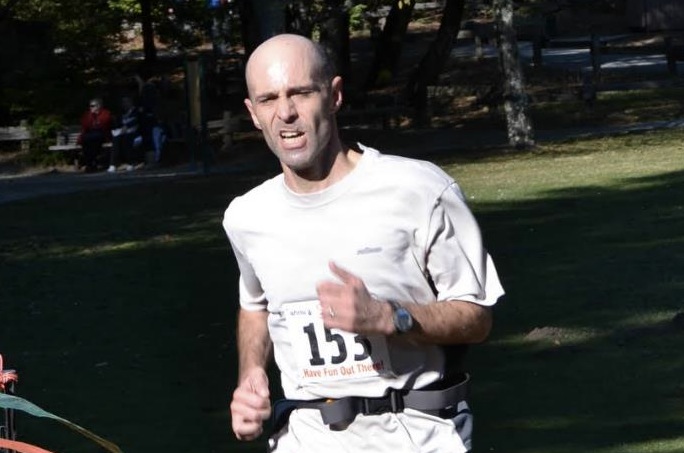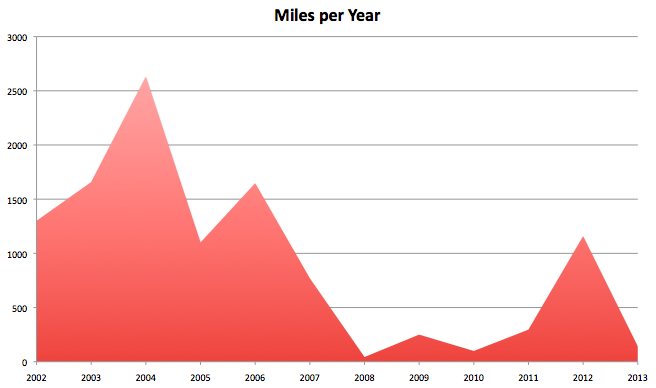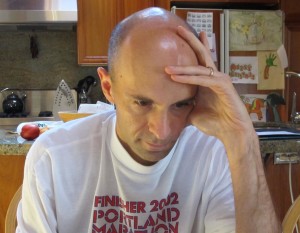 Anyone ages 9 to 90 can get outside and run, but if you’re competitive and enjoy racing, it sure helps to be young. As you age past 40, and the days of setting new personal bests are behind you, what motivates you to keep going? Do your reasons for running change as you get older? And what can an older runner do to stay competitive?
Anyone ages 9 to 90 can get outside and run, but if you’re competitive and enjoy racing, it sure helps to be young. As you age past 40, and the days of setting new personal bests are behind you, what motivates you to keep going? Do your reasons for running change as you get older? And what can an older runner do to stay competitive?
As I’m now a “masters” runner myself, these questions have been much on my mind. Watching the Olympics over the past weeks, I was struck by the fact that for the first time, every single athlete is younger than I am. Not that I ever had Olympic aspirations or anything close to it, but this was the clearest signal yet that my peak athletic years are behind me. That’s a sobering thought.
My running career began 12 years ago, at the age of 31, and I took to it with a passion. I’d never been into sports while growing up, and wasn’t particularly fit, but suddenly here was something athletic that I was actually halfway decent at. Improvement came quickly, and I collected a few age group awards at local races. New PRs came easily and often. I increased my training volume, ran several marathons, and later qualified for and ran the Boston Marathon. I read all the training books, logged every detail of every workout, and took the whole sport very seriously.
Four years on, around age 36, things started to change. New PRs became rare. I had to do a high volume of training simply to match my old race performances, and forget about improving on them. Before long, I started to lose interest. I’d been motivated to run 50+ miles per week when it was bringing me constant improvements, but I wasn’t interested in training that hard just to match what I’d already done in the past, or even slip backwards. I floundered, and cut way back on running. I haven’t raced a marathon since, and my training volume in the eight years since then has been much less than during that early period.

I look at this graph with some regret. While it’s easy to judge things in hindsight, I probably gave up too easily. Yes, improvements had tapered off, but if I’d kept at it and maybe tried some alternate training methods, I probably could have eked out more. I read somewhere (Daniels’ Running Formula?) that whatever age he or she starts, a runner can normally expect to see continued improvement for about 10 years. I gave it less than half that.
For the past eight years, my running has moved in cycles of a few months of enthusiasm followed by more months of low or no running at all. Part of this is mental: I’ll get excited and build up my training volume for a few months, but then when it becomes burdensome or the rate of improvement begins to slow, I just drop it completely. The bigger factor, though, is injuries. In the early years it felt like I could run forever, and while I might be exhausted, my body was fine mechanically. In recent years my body has seemed more like a junker car, with something always broken. Problems with my knees and ankles are always plaguing me, forcing me to skip workouts and reduce training until I just give up. Eventually they’ll heal and I’ll start running again, only to be sidelined by a new problem.
2012 was a halfway decent year and I logged over 1000 miles for the first time in six years, and even set a new PR at 8K. But then I fell apart again, and ran almost zero for the entirety of 2013.

As 2013 wound to a close while my running shoes gathered dust, I wasn’t a happy person. I wasn’t getting much exercise, and I felt guilty, cranky, and depressed. Around Christmas I finally decided that I had to force myself to run a few miles a week, as a prescription for better physical and mental health, even if I didn’t feel up to it. I viewed it like taking medicine. So I ran three miles every other day for a while, and a funny thing happened: I felt better. MUCH better. I’ve often read about the psychological benefits of running, but this was a much bigger boost than I would ever have expected. It was like I’d suddenly gone on Prozac, while all I was doing was jogging around the neighborhood.
Then another funny thing happened: I started wanting to run more, to train, and to race again. To avoid burning out anew or risking another injury, I kept with the every-other-day running schedule, but bought a home spinning bike for extra cardio workouts on non-running days. I also changed my routes, dropping the road courses I’ve followed for most of my running life for new routes that are almost entirely hilly singletrack trails.
While it’s only been a few months, so far this combination is working great for me. I feel strong, I’m injury-free (knock on wood), and I’m actually enjoying my runs for their own sake instead of viewing them only as a means to an end. I’ve developed a new interest in trail running as well. Instead of running my 50th road 5K and being disappointed with my finishing time, I can run some crazy 10.73 mile trail race through redwood forests, and feel great about pushing myself and being alive. Next week I’ll be running a trail half marathon, and in June I’ve got the Skyline to the Sea trail marathon, my first full-length marathon in eight years.
So there is life after 40, at least for this runner. I may no longer be able to match my times from 10 years ago, but I don’t feel like I need to. I’ve come to appreciate the physical and mental benefits of regular running, outside any worries over races. And my renewed focus on trail running has opened up all kind of new possibilities: ultramarathons? Adventure races? Who knows what’s in store, but I’m excited to find out!

2 thoughts on “Running Past 40”